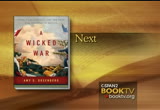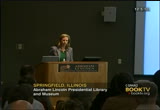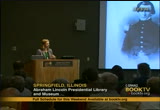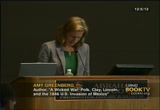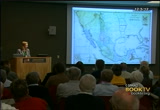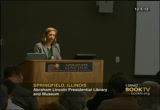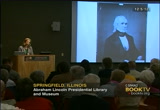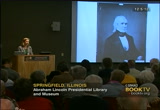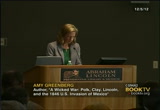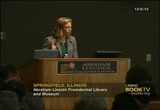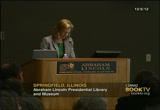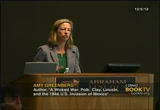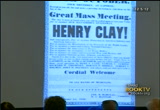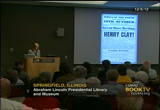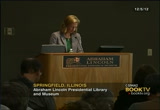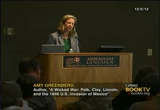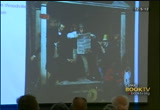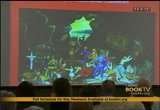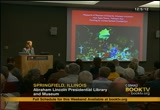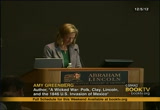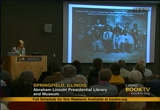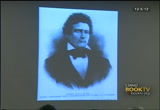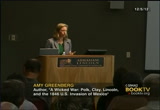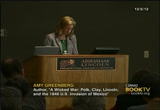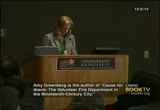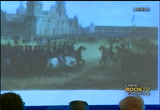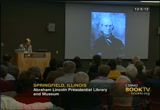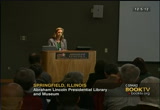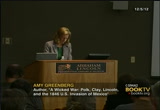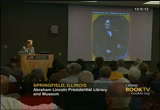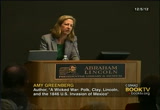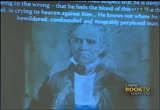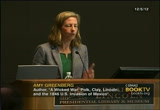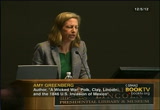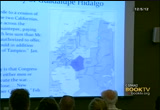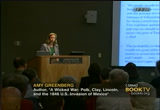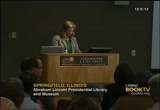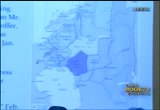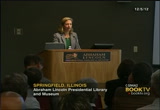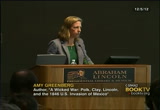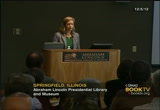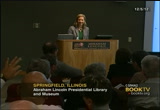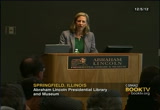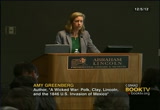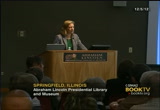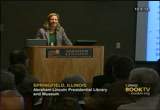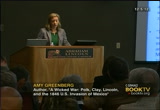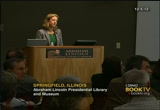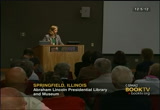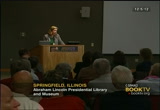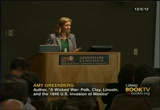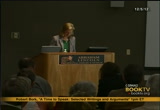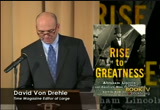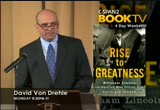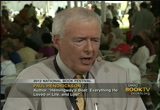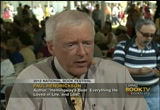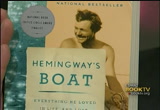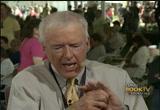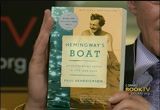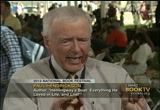tv Book TV CSPAN December 22, 2012 12:00pm-1:00pm EST
12:00 pm
this is but now are. [applause] >> thanks, denise. want to thank everybody who has been so nice to be here at the abraham lincoln presidential center. i have seen the benito juarez exhibit, which i encourage all of you to go see. a very big event. it is it fantastic show and really the relationship is so intriguing. one of want to talk to you about today's my most recent book in the invasion of mexico. the title is taken from my "from ulysses s. grant. from where it is live he looked back on everything that he had
12:01 pm
done in his career and in his memoirs he writes frankly about the experiences he has had the good and bad. it makes for really good reading, but one thing the crack spent some time thinking and talking about late in life was his role in the u.s.-mexico border of 1846. grant said at the time i do not think there was ever more wicked were then that waged by the united states of mexico. i thought so at the time when i was the dexter, only i had not moral courage enough to resign. during the time of the u.s.-mexico war, i just found this are really moving "which is why it took it for my title. the fact of the matter is grant was not alone in thinking that the u.s. invasion of mexico was somehow wicked. wanted to talk about in this book and tonight is the evolution of the american public during the course of the u.s.-mexico war from being with
12:02 pm
it -- really enthusiastic and in favor to largely turning against the war. i see the u.s.-mexico war as the moment of america's first antiwar movement actually coming into being. there was anti-war sentiment during the revolution and certainly during the war of 1812, but that sentiment was limited. what you see happen is a consensus across the board. people from different regions of the country, soldiers in the field to officers, politicians, all the signing that a war that was being more less successfully waged in another country was wrong and actually protesting that war. i think this is an interesting moment in american history cover and it takes place in the world that people don't know much about. people don't write about it a lot. it does not have a big place in the historical imagination of americans, and there are a number of reasons for that.
12:03 pm
often confused with the texas revolution that happen before or ignored altogether. one historian stalker of the u.s.-mexico war, they tend to think about the war in relationship to the civil war. they merit the u.s.-mexico war as the first stop on the road to secession, arguing that the land that came from mexico with the close of the war was what really caused sectional is in the heat. in fact, all that's true. you can look at it as the moment the civil war became inevitable, or you can look at it on its own terms, which is what i try to do this book. what i was interested in doing whenever of this book was to sell the impact of the war on individuals and families. the u.s.-mexico border in the highest mortality rate of any american more, 15 percent of soldiers who served in mexico for the united states died.
12:04 pm
78,000 troops to land it was a war that had a big impact on people's home. i want right narrative that export help people in the united states in new mexico, hellebore impacted them and their families abraham lincoln makes his first major political speech that i found to be quite widely documented in disgust in newspapers. it's condemning the war. the first political stance on the national stage is actually against the u.s. mexico or. another person i talked about is john j. horgan who saw of you may be familiar with, part of a very important family in jacksonville. and for a time he was leading with politician in the state of illinois. this is hard instead that the
12:05 pm
u.s.-mexico war that have made lincoln's path forward possible because he was under the shadow of john harden before that happened. "italian little bit about the war. the north american invasion began when president james k. polk sent troops into a disputed area between the new lenses and rio grande rivers with the intention of starting a war he wanted war. he was sent on this -- declaring war. the day before he found out that mexicans have crossed the rio grande and killed 14 soldiers in this disputed area, he went to his cabinet and said, i think we should declare war. his cabinet set to we can't because the mexicans haven't
12:06 pm
done anything. we set for those american troops talent into land that mexico things is theirs, and we're waiting for something to happen. then he finds out the next day that an incident had happened. and when he get this error of -- incident he went to congress on may 111846 and stated mexico is passed the boundary of the united states, has invaded our territory and shed american blood of american soil. not to put too fine a point on it, this was all i. a party, which was the opposition party, everyone in the party in congress knew that the land had always been considered mexican resident texan land. and a lot of congressmen, but privately to each other after
12:07 pm
the statement, the eddy that this is american sorrell the blood is been shed on is pretty dubious, but the fact of the matter is, everybody winds up and they vote in favor of his declaration of war. the wigs are afraid of looking unpatriotic, suffering and the level of not being patriotic. all but 14 members of congress vote in favor of declaring war against mexico. the mexican were short, 20 months total and only 16 months of those are actual fighting. as you're going to hear today, the world was not short enough for the american people. it was marked by a number of standing military successes by a united states such as the battle of buena vista where 5,000 u.s. soldiers defeated an army under general antonio to santa ana.
12:08 pm
between 15 and 20,000 soldiers. the number in ratio is obviously quite astounding to all but the fact of the matter in almost every battle mexican troops greatly outnumbered u.s. troops, yet they won every single military engagement in this war with the exception of the battle of san pascal which americans prefer to think of as a skirmish rather than a battle. that doesn't really count. three theaters of the war. in the first stage of the general security but in mexico with key victories including this one in 1846 in the first wants of 1847. the second theater of war, travels west from fort leavenworth in kansas through new mexico, cochrane in mexico and only california. unfortunately, neither of these tremendous victory spring what
12:09 pm
he wants, which is peace and the securing of california and texas into the american union. mexico refuses to surrender despite the victories, so he decides to send general winfield scott to invade mexico. he bombards the veracruz and travels through central mexico securing a capital in the fall of 1847. in the eyes of americans it was sort of a foreign conclusion that their side when and win easily because most are byrd a host of racist beliefs about mexican men foremost among them being that mexican and one lazy and cowardly to fight. in point of fact mexican troops fought very hard, as you can see , very few images, so it's rare when you find one. you can get a sense.
12:10 pm
mexico lost all of these battles and ultimately lost the military side of the war because they have vastly inferior weapons. their leader was terrible. mexico's government was in turmoil. there were broke. there were various panels were there was no money even making it to the army to support itself . because hostile net of american tribes in the north of mexico has so ravaged on the mexican that there was very little will to resist. now, on the mexican side most of the army was made up of conscripts who did not tend to fight as hard as some of the mexican troops. on the u.s. side most soldiers were volunteers. that is the interesting thing. the start of the war support was so overwhelming, particularly here in the midwest that many more been volunteered to fight and could actually be taken in volunteer regiments.
12:11 pm
overwhelming enthusiasm for the war. and the midwest provides the most troops fighting in mexico. a lot of people think is the south. it isn't. nonetheless, support for this war was not universal. here we have a campaign poster for henry clay who was the nominee in 1844. his opponent in 1844 was james k. polk who ran on a platform of the next in texas and expansion is in generally planning he opposed axing taxes because as you can see, he believes will result in were from mexico. i love this poster from a campaign appearance in indiana. he looked at the less, ye shall support in reply from 44, the first couple are typical
12:12 pm
economic positions. so they're generally the party of economic development in the united states and the 1840's, when you get down to the fourth reason, argue for or against the annexation of texas, for or against an unjust and disgraceful war with mexico. my favorite one, for or against national perfidy, this summer, in disgrace. this is what they say. if you don't vote for him reply you will bring national disgrace of the country will be with the war in mexico. clearly people could see the writing on the wall. canoeing and anti slavery sentiment was widespread and also anti war. so the massachusetts house representatives states this war is immoral and they're going to oppose it. a lot of doing when
12:13 pm
intellectuals provide a really concerned -- and changing critiques of the war. all these people speak out in pretty strong terms. now, i think that if opposition of the war had remained limited to new england it would be interesting, but it would not be that different from what happened in the war of 1812. what you see happen is over the course of the war illegal of stopping the only place where people protest the war actively into begin to see in national anti-war movement grow. there are essentially four main grounds upon which americans oppose the war. the first one, which you can see clearly, is on the grounds of morality that this was an unjust war which would bring national dishonor on the united states. a congressman josh with giddings ohio repeated theward has representatives that in order to be patriotic people had to dissent from this aggressive, and holy, not just for.
12:14 pm
in the murder of mexicans upon their own sorrow or robbing them of their country, i can take apart either now or hereafter. and he was rather strong in his opinions, but that was the kind of critique the ec certainly by march of 1847 when the united states bombarded the town of veracruz bidding to the deaths of a lot of civilians. and anti american critique. the second grounds were slavery and giddings was an abolitionist , but it was not just abolitionists are people in new england in tucson issues of slavery be really important. it would make slavery sprayed and make the slave power stronger
12:15 pm
again, it was not just people in newfoundland. consider for a moment this very popular print. maybe some of you have seen this. it's kind of a neat image of the power of newspapers. this was called the news from mexico. sort of a well-known and respected artist at the time. first it looks like an image of people being enthusiastic about the war. had just gone news in the newspapers. in fact with a u.s.-mexico war was the first war were journalists traveled and were embedded with troops. this is the first war where people are getting in the business about what is happening , first in the count from journalists traveling with the troops. elected the image more closely. first of all, what phil was from baltimore. notice how he places slave's right up at the front and center
12:16 pm
. a think he's asking you think about, and if you look to the edge you can see a guy who is tossing a match into a barrel suggesting, what is mexico really going to do except set off a firestorm which is an average from baltimore about the war. another major critique of the war had to do with what people saw as the impact of service in mexico on the american character people worry that the mexican war was making the american character bourse. it was degrading american soldiers and turning them into the kind of people that we really didn't want to to be. this critique became especially strong after reports of very bad behavior by american troops making it to u.s. newspapers which i see happening about the
12:17 pm
middle of 1847. particularly in northern mexico, the volunteers are a total of about the age extern the badly, murdering civilians in the street, raping women, reports of entire villages being burned down, and general zachary taylor felt like he really could not control the volunteers. they were under the control of their own commanders coming from their own towns, and none of them really seemed to abide by the kind of discipline that taylor expected in basically got from the regulars. here is one image of a massacre of 25 mexican civilians by arkansas volunteers this was painted by a soldier from illinois he claimed to see this massacre happened. he didn't have to see it. it was reported over the united states. they were taking revenge of the
12:18 pm
people of mexico for the murder of one of harold. they indiscriminately getting a bunch of mexicans and took them into a cave until the. this was a really wise the reported incident but by no means was exceptional. a couple weeks after this happened there was another massacre that was similar that was perpetrated by texans. so the american people reading about this kind of behavior helps turn them against the war. the st. louis republican was a newspaper that, when it heard about this massacre initially claimed that they could not be true. they said there are rumors that they are not true, was the newspaper at verification of it actually wrote to all of its readers and said, let us know what it complain about mexican barbarity. port emigrated, no active in human cruelty perpetrated by her most as performers can xl the work of this to the committed by her sultry. this is running an american
12:19 pm
paper. finally, the fourth reason and perhaps the most important reason why the anti-war movement spread and becomes a major force america is basically racism. a lot of americans felt like it would bautista corrupt american men had but degrading the united states all together by watering down what americans believed to be there in the sex and blood through the incorporation of mexicans. south carolina's greatest orator and intellectual, john c. calhoun, who was a firm believer in the importance in need of slavery was a very active opponent of the war with mexico busy that the mexicans did not belong in the united states. he said to my protest against the incorporation of such people ours is the government of the white man. a lot of americans felt like mexican land might be desirable,
12:20 pm
but having to take mexican people with the post a problem. it was the intellectual ministers making these critiques one of the contributions that my book does is showing the role the soldiers and officers play. so this brings me to colonel john hardin of illinois, a gentleman and already entered used to into i've come to know well after spending many yours with his family papers in jakarta. again, from jacksonville, former weak corporate -- congressman part of the wealthy and prestigious kentucky family related to henry clay, both through marriage and glad. the first man to volunteer to fight. he was volunteering before even started. repeatedly writing letters to stephen douglas.
12:21 pm
and he already had a lot of military experience, flat in the black hawk war, an officer in that and he wasn't charged that taking the mormons and the state of illinois. a big military guy and political guy. he really wanted to fight mexico. he wrote letters to newspapers say, this is our greatest possible opportunity to gain california for the u.s. if war is declared, will be at the front of the movement committee was. now, he is a very, very a chat about the possibility of taking a lot of mexican territory. a big proponent of manifest destiny, but his views changed quickly and dramatically. when he first gets to mexico heat writes about potential silver mines that he has heard about and says, the silver mines here are supposed to be the richest and mexico, and we are only abandoned by the ignorance
12:22 pm
of the mexicans. it will only require a little skill to make these valuable. really excited, and he can see mexican american hands. the lottery's bins, the less he likes. in early december 1846, a few months after he arrives in mexico he wrote his law partner, there is not an acre in 500 here that a man in the lamar would pay taxes on. the people of mexico were far worse. i've never seen a drop in mexican. that is the only bit -- good thing i can say about them. few intelligent men who were over the rest. as many slaves as the gross in the south. treachery, deceit, and stealing. it would make a measurable addition to any portion of the population of the united states. to another friend he wrote a week later that the only difference between the beyonce mexico and the slaves of the south is their color. he says, as for making them voters and citizens of the united states, it should not be
12:23 pm
thought up until we give all indians about. although i was for annexing of this part of mexico, and act out it's worth it. pardons' evolution from this abbott expansionists to a xenophobic senate of the world was a rapid want, but it was not uncommon. his views were shared by many in the army. midwesterners initially shared the most enthusiasm for the war in mexico at mobile many decided that taking parts of mexico was not such a great idea after all. their exposure to the land and people of the bequest to the future of death as destiny in the region and their commanders were no more disease and stick. both taylor and scott pushed for a quick end to the war and expressed reservations about the
12:24 pm
value of mexican territory to the united states. the national anti-war movement became a particularly heated thing after the troops captured mexico city on september 14th 1847, and here's an image of scott entering mexico city. if you look at the lower left-hand corner, you concede someone picking a barack in preparing to throw at the american troops. this is an immense that expresses the extreme hostility of many people in mexico city to having their city occupied by american troops. initially americans are extremely enthusiastic about the fact that their army had conquered the capital of another country, but when mexicans still refuse to come to terms and in the peace treaty, what began was very bleak occupation that ended up being terrible for the army in terrible for the pro-war movement generally. winfield scott's troops were suggested to daily -- subjected
12:25 pm
to daily guerrilla warfare, and there was no end in sight because mexico refused to get up at the same time a lot of expansionists in the united states, once the united states captured mexico city argues that maybe the u.s. should annex all of mexico. if you already conquered the capitol city, one that take all, and it is at that -- is at this one that people begin to question whether this should go on any further. the turning point in the creation of the national war movement occurs two months after scott occupies mexico city on november 141847. henry clay give a major anti-war speech in lexington techie after the war against the war. clay had been out of the public spotlight senses disastrous and terrible defeat by james k. polk in the election of 1844, one which she never expected and
12:26 pm
could not believe. unfortunately, henry clay not only had to suffer through that defeat, but his namesake and favorite sun volunteered to lead trips to mexico. so he becomes a leader of kentucky troops, takes them down to mexico, and he is killed at the battle of buena vista just like john j. harden. so clay has to face the death of his son in a war he did not believe in. after his son's death it becomes very religious, gets baptized in the episcopal church in decides to make a speech opposing the war that he hopes will bring the war to a close. claes speech which is a hugely important because reporters traveled over 100 miles to hear it, and the newly invented telegraph meant within a couple days of the speech being uttered by him it was reported around
12:27 pm
the country. his speech really touched on all of those grounds for opposing the war that i mentioned. he talks about how immoral it is, that the u.s. has lost its reputation abroad. he talks about american soldiers being disqualified by allowed spirit of literature from returning to civil society. insists that slavery is a great evil and he also makes it clear that there are racial reasons to oppose the war. clay asked his listeners, does any consider it and believe it possible the two populations to in congress so different in race, language, religion, and law could be blended together in one harmonious math? after this sort of rousing speech play called for mass meetings around the country to end the war. and people actually took him up on it. i located over 30 meetings in support of his anti-war resolution from indiana to the
12:28 pm
jersey and louisville to maine. this geographic scope of people who basically are meeting together in public forums and saying, we need to leave mexico and end this war immediately. it's well beyond the opposition of the war of 1812 and constitutes the first national grassroots anti-war movement in american history. i should tell you. what clay asked to have happen was for the united states to leave mexico and not take any territory from mexico altogether . he won a piece without territory which, of course, did not happen. just two weeks after clay's speech, the 30th congress convened in washington and guess who was there? iran led. he heard plays speech in lexington because he was visiting the town on his way from springfield to washington d.c., visiting the family in lexington. while he was there he got to hearing in replace speech. this was a tremendous thing for abraham lincoln. he always idolized like, calling him his bell ideal of a
12:29 pm
politician and to have the opportunity to hear him speak must've been a huge thing for him. lincoln, when he was young, carry around a book of clay's speeches it used to read into of self, and when he was a young man and legislator he would be president of the classic club and ask henry clay to come speak in springfield. this is really like is opportunity to meet the politician he respects and admires the most and he heard him give a speech against the war. perhaps it is a surprising that when lincoln gets to washington, instead of talking about tariffs or any of the economic issues that have really motivated as a politician, he decides to oppose the war. the first speech that lincoln gives in congress is what is known as his bought resolution very basically gets up and calls the president a liar for claiming that american blood was shed on american soil. ..
12:30 pm
12:31 pm
case. and the speech you see here, trend across the united states. this was lincoln's first case of national acclaim and attention. the president was confounded back in summer of 1847, polk dispatched to negotiate a treaty with mexico. wants scott occupied mexico city. polk began to think we should take more of mexico than the treaty stipulated. polk wanted to see baja, calif.. he wanted to see the state of sonora in the united states. he had expensive designs with the united states should take which were more than he told nicholas. he told crist to come home and he refused to come home. tryst along with scott, decided
12:32 pm
it was the most important thing he could do and afterwards said himself he wanted to make a tree that was not exacting to mexico. he wanted to save the mexican people from a continuous civil war and dismemberment of the country so he said i am not going to come home and made a treaty despite the fact that he wrote to his wife i will probably never work in washington again. my career is over and his career was over. polk was so angry that he withheld tryst's pay when he returned to the united states and tryst, his family became incredibly poverty-stricken and wasn't until after the civil war when ulysses grant was president that tryst got another position at the end of his life and given a sort of not very demanding position running a post office in virginia but until that point tryst was broke and his family suffered terribly because of it.
12:33 pm
let me just kind of wrap this up and tell you what i think the anti-war protests -- the quote i have here is a quote from january of 1848 and this is what he said to his cabinet. he said at this point he might be willing to accept a section of new mexico and -- as well as california, the passage across -- paying for them a much less some then mr. tryst was authorized to offer and secure the port. if you look at this map which turned on its side to show the importance of the gulf of mexico you can see various lines that demonstrate what people wanted to take. let me see if i can get this going. this is the initial line that mexico offered and if you look here, this is what polk was
12:34 pm
hoping to take in january. what that would have brought is an additional one third of the country of mexico into the united states than what ended up happening. unfortunately, on february 19th, the tree arrived by the negotiated that is no longer legal and mexican counterparts and polk decides to accept the treaty because there is no longer congressional support for the war and he thinks long and hard about that and writes in his diary i may have to fix up the street even though i don't like it and it is less than i wanted the probability is congress would not grant men or money, new mexico and california. just to conclude, did the anti-war movement achieved goals? certainly not. henry clay wanted the united states out of mexico without taking any territory. i don't know that it was an extremely realistic position but
12:35 pm
this was clay's position. did the anti-war movement end the war? i feel strongly anti-war education in congress and on the ground forced polk to bring the war to a close even though he wanted more territory. it did limit the territorial acquisition from this war. i believe that had polk been allowed to continue fighting, mexico would have been forced to give up more land than it did. it definitely mobilized the public in support of bringing an american war to a close for the first time. it is important to acknowledge antiwar movements existed in the past, that they can work, they can have real effect and limit the loss of life. the anti-war movement in the mexico war did all these things. thank you very much. [applause] [inaudible]
12:36 pm
>> sure. all right. so. this is the area that mexico initially was trying to give up which is california going directly -- san francisco bay as well. this is what the united states end -- this is what is down here. basically wants to come down here and come here, what we truly love and talking about.
12:37 pm
12:38 pm
and the civil war, and the u.s.-mexico war, also kind of a message america could believe in. and americans, talking not about southerners here, they were able to craft a narrative which is extremely uplifting. it was a much bigger war, many people were involved so that overshadowed it. the important reason is i do not think americans tell themselves about military involvement. if you think americans like to commemorate, there is some length, if 14-year-old daughter, when hardin was killed.
12:39 pm
she was devastated, and the american revolution. her thinking about the american revolution is it is a war that will teach people patriotism so she becomes this prolific author about the revolution and a defender of battlefield in saratoga, and an important national figure. he she never talks about the u.s.-mexico war even though her father being killed in that war was a defining factor in her life. the revolution for a lot of americans, that is a war that is about principle, the civil war is about principle and world war ii is about principle and these other battles that we are involved in, that i thought were principal. and certainly the u.s./mexico war fell into that category.
12:40 pm
12:41 pm
the paragraph newspaper, and when the mexican workers realized the union was on strike, they refused to work effectively. there is a huge turnaround as far as attitude and what happens to the people. >> there is that there isn't a change in attitude. a lot of people of the united states are happy to import mexican laborers as long as they can be sent to mexico once labor was done and it was really incredibly unfair to mexican laborers and a model that importation of other laborers continue to stay in terms of disposable laborers who have limited rights that can be brought in and send back at well. in terms of the way mexican people who became part of the united states, and looking at
12:42 pm
this, a number of mexicans who support the u.s. cause, they would be better off under a u.s. government than they are under mexico's government. mexico does not treat the residents of its northern territories very well, does not provide protection by indian tribes, and large landowners in california come on board the u.s. and support u.s. troops and troops with horses and munitions, those people lose their land, there are supposedly go rights that are given these people, those local courts are incredibly racist against -- and you see similar things going on,
12:43 pm
and attitudes towards mexican people, i publish an op-ed piece, looking at the origins of what republicans referred to as the latino immigration problem and if you look at the last election, the republican party looked and said afterward, we change how we talk about immigrants. latinos voted overwhelmingly, a number of house races which were supposed to be tossups going to democrats because latinos in the area voted 75%, there's an ongoing problem. and the areas you're talking about here and were taken from
12:44 pm
mexico. and a anglos are -- leads, a really good point. >> the observations on the anti-war sentiment, why there seems to be such popularity associated with the filibuster movement. william walker invaded baja. >> that didn't go very well. [talking over each other] >> did not succeed. why was he so popular. it seems as though it is a different era a new -- >> i wrote a book about this cobb manifest manhood and it is all about support for filibuster's.
12:45 pm
william walker and his exploits are perfect. very sad. doesn't know what he was doing. and he is tried on violating neutrality rules, he goes free because you can't find a jury to convict him and a lot of americans believe in manifest destiny. when walker gets to central america and becomes the president of nicaragua he becomes a huge national figure so there are a lot of people in america who still have very expansive views of what the united states could become. is not unusual in the 1850s for people to talk about the united states encompassing all of central america, canada and even south america. this is what people think is going to happen. how do we deal with that situation? it is not a coincidence that william walker supports slavery. his idea, to bring african-american slaves into the
12:46 pm
area, some people -- enslave central americans themselves. a strange and unusual situation but filibustering is very unusual ending u.s./mexico war. and the seeming ease with which the u.s. took half of mexico's territory emboldened expansionists to say to get that much of mexico we can get central america no problem. [inaudible] >> kind in -- first question is -- has to do with immigrants coming to the united states from the 1840s, did they have an opinion or observation about
12:47 pm
war, and the integration to u.s. society, the second question is core montgomerie and does reporting affect the national attitudes or does it continue to fester the idea of manifest destiny? >> i read a lot about that. some people are basically implicated -- to go a peace treaty but basically a lot of support for that -- i don't think cora -- she certainly does in the filibustering exploit from the 1850s and is a big proponent for a sort of northern view that annexing mexico would help raise relations in the united states as opposed to slavery, providing an outlet for slaves, promotes this crazy idea
12:48 pm
that if we take mexico or parts of mexico or central america, slaves and free blacks will flow south in the united states. yes? she wasn't the only person -- hard to believe anybody took the stuff seriously and i don't know what they did. the other question about immigrants is interesting. the 1840s and 1850s of the period of the highest rate of 4 immigration in the united states in american history. we think it is the late eighteenth century which is the real immigration period and in terms of numbers, most immigrants come to the united states the the 1840s and 50s in percentage of population you have huge numbers of irish people fleeing the potato famine and from germans with a terrible economic situation in germany and other immigrants coming in to the united states and posing a lot of problems, in the
12:49 pm
northeast especially and assimilation. a lot of immigrants fight on the u.s./mexico war. they don't have economic opportunity. it is not very good soldiers. and the santa true ceo. they're all i ridge men because they carry an irish flag, when they look at the people, the germans too. one thing i didn't talk about is tension between catholicism of mexico and mainstream belief of most americans, a lot of americans go to mexico and convert catholics and redeemed
12:50 pm
catholicism and immigrants, he always translated german accounts, and the elephant wars a terrible idea. they think it is ridiculous. european are always able to see from the beginning the flaw with this idea, neighboring republic in order to take the territory. there's a lot more i could say about this. i have one more question. [inaudible] >> leader of mexico. >> i will send you all to see -- and not answer that. see for yourself because it is such a wonderful exhibit. thanks so much. [applause]
12:51 pm
>> visit booktv.org to watch any of the programs you see your online. tight the author or book title on the search bar on the upper left of the page and click search. you can also share any thing you see on booktv.org easily by clicking share on the upper left side of the page and selecting the format. booktv streams live online for 48 hours every weekend with nonfiction books and authors. booktv.org. >> i don't want to spoil the book for you so let me just say that the year began with the american republic in grave danger. the union armies were struggling to grow virtually overnight from a few thousand coupes to scattered across the continent to more than half a million. the inexperienced officers brought to command these raw volunteers were stymied by the
12:52 pm
sys of the breakaway confederate states of america. which covered a space larger than the entire european territory conquered by napoleon. lincoln's closest advisor was secretary of state william henry seward who said even smart people fail to see the difficulty of the union task. they did and apprehend the vast extent of the rebellion as he put it. military operations to be successful, hitherto practically unknown in the art of war. >> strained federal union forces, on 1862, abraham lincoln rides to greatness. four days of booktv. >> everything he loved and life
12:53 pm
and lost. mr. hendrickson, what was people are? >> the seagoing fishing cruiser that hemingway bought in 1934 and phone for the last 27 years of his life, probably the most beloved material possessions that he ever owned so i thought i could tell the hemingway story in a news story through a figurative storytelling device. >> what did you find out? >> i went to cuba -- 1935, that is when he had the boat and in 2005, when the guards weren't looking i surreptitiously been over and touched the boat which was a moving experience because the boat was dry dock, was on a
12:54 pm
hillside at hemingway's home and was in terrible condition. it looked as if it were dying of first and only wanted to get into water but that further convinced me that i had a story to tell through the prism of this boat because when hemingway got this boat he was the reigning monarch of american literature. he was at the very apex and when he lost this boat has when he lost everything when he killed himself by shotgun 27 years later this boat lasted him through three wives, the nobel prize, and on his -- subtitles "hemingway's boat: everything he loved in life, and lost". >> host: where was it built? >> guest: it was built in a shipyard in brooklyn by the wheeler manufacturing company which in 1930s was a very reputable fishing boat crews airboat wooden hull construction boat company.
12:55 pm
typical hemingway, he studied it out and look for a long time before getting the exact boat that he wanted and he had it custom fitted. it was a stock boat that came off of the production line but it was fitted out to his specifications and went into the gulf stream and the gulf stream off of key west and began catching these 850 pound marlin. that became his refuge from the world. >> what did it cost? >> guest: great question. the bose in 1934 cost $7,500 and he put down $3,000 as that down payment which was given to him by the editor of a new magazine in america called esquire and arnold gingrich was the editor and he said i will give you 3,000 -- if you start writing some articles for me. >> host: you spent a bit of time on hemingway's family.
12:56 pm
why? >> guest: i wanted to understand all of the people, not just hemingway himself who came across the transom of that boat. one of the most powerful stories is quote story of his third son, gregory, who grew up to be a doctor, who was a transvestite who ended his life as a transsexual. i tell the story not only of ernest hemingway but ernest hemingway and his children and other people intersected with the life of this boat and it is a kind of multi biographical approach which seems to be what i know how to do, maybe the only thing i know how to do. >> host: gregory -- >> guest: gregory -- pawpaw's nickname -- he nicknamed everybody -- that is how it was pronounced -- he actually became gloria for the end of his life. he had a complete exchange and
12:57 pm
died tragically in 2001 in a woman's jail cell in miami and i knew his nickname because of the washington post reporter in 1987, i tracked down all three hemingway sons and i spent time with the eldest, with the middle son who was alive and with the third son who died in 2001. >> host: one is still alive. >> guest: patrick is 84 and lives in montana and he is the surviving hemingway son who had a lot to do with the life of his father's both which he lost. >> host: all three sense than time? >> guest: absolutely and hemingway was married four times with three wives with time on that boat, but through a combination of archival research and letters and going through various repositories of hemingway material i was able to find out that this both became
12:58 pm
such a central idea to hemingway's existence. he would take it out there so to speak, get away from land, but it is a funny thing, you go out there and your demons follow you. you think you are getting away from them. all your problems on shore, as we know, come with us. >> host: we know about the alcohol in ernest hemingway's life. how extensive was it and what about depression? does that factor into his life as well? >> no question hemingway suffered from what we would now recognize today as manic depression, bipolar, alcoholism. i think if he were alive today he might be medicated that would have prevented these things and possibly his suicide which raises a very thorny question. would he have written as
12:59 pm
brilliantly as he did if he weren't suffering so much? that is a hard, hard questions that too many artists have to face up to. >> host: paul hendrickson longtime reporter for the washington post. what other topics have you written about? >> i read about robert mcnamara, very president name in this city, architect of vietnam's. that book was published in 1996 called the living and the dead. i wrote a book called sons of mississippi which is the book previous to this what was a study of the civil-rights south and the integration of james meredith at the university of ole miss. i like to pick out subjects that i feel have a lot of resonance to our cultural history, biography, and -- >> paul hendrickson's most recent book, national book
173 Views
IN COLLECTIONS
CSPAN2 Television Archive
Television Archive  Television Archive News Search Service
Television Archive News Search Service 
Uploaded by TV Archive on

 Live Music Archive
Live Music Archive Librivox Free Audio
Librivox Free Audio Metropolitan Museum
Metropolitan Museum Cleveland Museum of Art
Cleveland Museum of Art Internet Arcade
Internet Arcade Console Living Room
Console Living Room Books to Borrow
Books to Borrow Open Library
Open Library TV News
TV News Understanding 9/11
Understanding 9/11